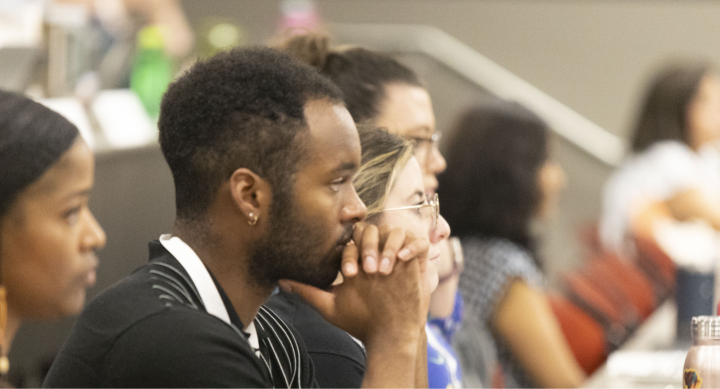
Highlights from HCLI 2024
07/30/2024
“We’re in an era now where there’s peak suspicion around public health. But the flip side is that there are glorious examples of public health."
- Pritesh Gandhi, M.D., MHS
It was the perfect sentiment to kick off our 10th annual HCLI—a dose of hard truth, with a heavy sprinkling of challenge and inspiration.
CHC affiliate and retired physician Dr. Rob Milman and Cynthia Oelkers (Conclaro) kicked off the week with an HCLI tradition—a set of improv warm-up exercises. We had fun—especially during the rock-paper-scissors showdown! —but we also learned how improv strategies can make us better health communication leaders. Together, we practiced how to approach work with curiosity, take risks, and allow ourselves to fail. “After all,” said Oelkers, "There’s no innovation if we can’t risk something new."
Let’s revisit some highlights from HCLI 2024:
Meg Poag, MSW (Mission Squared) returned this year to speak about the principles of empowering leadership in today’s complicated, fast-moving world. She led attendees through their personalized skills assessment to help guide them to their maximum potential by settling into a leadership role that feels uniquely personalized.
CHC’s own Laura Anaya Rodriguez, MPH opened the health communication campaigns panel, followed by Anita Makkenchery (Westat) and Christina Thompson (St. David’s Foundation). The trio discussed challenges and lessons learned from their respective campaigns—from updating content based on user study findings, to understanding the depth and breadth of the partner role, to using data to inform policy change.
Stephanie W. Cawthon, Ph.D. (UT Austin) gave an eye-opening presentation on an essential topic—how to make more inclusive spaces for folks with disabilities. She challenged us to see how and where ableism might occur in our own lives, especially in everyday language, and spoke about how our understanding of accessibility needs to be fluid, dynamic, and intentional. She closed out the presentation with real-life strategies to help make our health communication campaigns more accessible for all.
In a research panel focused on communicating health data, we heard from Desmar Walkes, M.D. (Austin Public Health), Jennifer Deegan, M.A., MPAFF (UTHealth Houston), and Yan Chang, Ph.D. (UT Austin). We learned the dos and don’ts of crisis communications, ways to increase trust among diverse stakeholders, and how to deliver data to community members in a way that’s useful, accessible, and trustworthy.
In keeping with HCLI tradition, attendees assembled into groups for a case study on this year’s topic of choice—folic acid promotion. The groups shared expertise from their respective fields while presenting ways to tailor key messages and best reach audiences of different age, race, and ethnicity.
It’s no secret that policy implications lead to real health outcomes. So how do we forge partnerships with people when the values aren’t shared? Pritesh Gandhi, M.D., MHS shared his hard-earned answer. “You have to find shared value wherever you can. It’s all about relationships and bringing people together to define the narrative—and the way forward.”
Dr. Gandhi shared a real-life example from his time as Chief Medical Officer of the Department of Homeland Security, when Operation Allies Welcome (OAW) saw the emergence of a highly contagious measles outbreak threatening to spread within the US. In record time, all industries came together—government, academia, corporate, and nonprofit—to make core policy decisions that resulted in a historic, nationwide vaccination campaign for measles, mumps, rubella (MMR), and varicella (chickenpox). Their collaboration successfully resettled refugees into local communities, while also prioritizing public health and national security.
Dr. Gandhi’s inspiring words neatly summed up this year’s HCLI, and the reason we continue to hold this event: “It was a perfect example of what public health can do—and what’s possible.”
If you attended HCLI this year, thanks for joining us. We work hard to develop a valuable curriculum of health communication and leadership best practices that every attendee can apply to their role. We’d also like to take a moment to thank our sponsors—Fors Marsh, Whole Communities Whole Health, TEPHI, St. David’s HealthCare, and Westat. HCLI wouldn’t be possible without their support.
We're eager to see you bring what you learned to your work and your organization, so please keep in touch! We also hope you’ll tell your colleagues about your experience; we would love to host them next year. To stay connected with the Center for Health Communication and stay posted about future HCLIs, sign up for our mailing list. Hope to see you in 2025!

